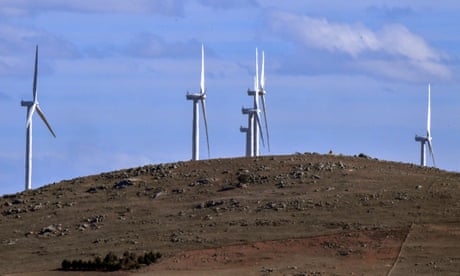- by foxnews
- 16 Mar 2025
Supply chain delays and steel costs are part of ‘perfect storm’ stalling renewable energy growth
Supply chain delays and steel costs are part of ‘perfect storm’ stalling renewable energy growth
- by theguardian
- 24 May 2022
- in news

Supply chain delays from China and the soaring cost of steel and other materials are combining to slow the advance of renewable energy in Australia and elsewhere, a leading insurer and industry groups say.
The cost of steel for wind turbine blades had risen by 50% or more since the Covid pandemic's start, even before Russia's invasion of Ukraine prompted a scramble to accelerate the switch away from coal, oil and gas to clean energy alternatives, according to GCube, a global insurer of renewables that has recently opened its first Australian office in Sydney.
"You've almost got the perfect storm right now," Fraser McLachlan, GCube's chief executive said. "We're seeing delays of six months at a minimum to get replacement parts and things like that coming out of China, sometimes more."
To order a blade for a multi-megawatt sized turbine can now take as much as a year or longer, adding to windfarm operators' costs. Supply chain disruptions caused by the extended lockdowns in China are also stalling supplies of solar panels, and may take months to be resolved, McLachlan said.
Delays to new projects or repairs to existing ones will not be welcome news for a power sector that has already seen a more than doubling in wholesale prices in the year to March, with further steep climbs since.
The spike in power prices - which is already pushing retail electricity bills higher - has been triggered mostly by more costly gas, which often sets the market's generation price. Outages by coal-fired power plants also haven't helped.
Renewables are already supplying close to 30% of the electricity for eastern states, with the incoming Albanese Labor government targeting as much as 80% by 2030. However, delays in new projects or curbs to existing ones could hamper progress.
"Supply chains have really broken down globally," John Grimes, head of the Smart Energy Council, said. Solar panels, inverters and batteries are among the products caught up, and facing rising costs.
"We'd have to go back to about 2008 to see prices increasing," he said, adding that this was before the full effect of Europe's efforts to shift off Russian energy hits.
Aaron Wood, director of external affairs for the Clean Energy Council, said renewables, as with any other industry, were not immune to supply chain challenges.
"Rising costs and ongoing shipping delays are certainly hurting many clean energy projects in Australia, but we're hopeful that we'll soon be through the worst of this period of global uncertainty," Wood said.
Still, while supply issues were important, they were arguably eclipsed by ongoing policy uncertainty that may now ease after the change of government.
"States have stepped in to fill the federal vacuum, but we still need federal leadership and national coordination," he said, adding overseas snags were also fuelling "a much greater focus on developing clean energy supply chain manufacturing in Australia".
The global supply challenges are outlined in a new report by GCube, a London-based firm recently taken over by Japanese insurance giant, Tokio Marine. About 8% of its annual underwriting worth $US140m ($200m) covers Australian renewables.
"Premiums have been rising, I would say, over the last four years," McLachlan said, adding, however, that they are not yet back to levels of a decade ago.
And while the cost of clean energy generation was lately rising, it remains a lot cheaper than just a few years earlier in part because of increasing scale and other technological improvements. Wind turbines were now reaching capacities of 10 megawatts each, although that size complicated repair and maintenance issues given the more onerous task of fixing or repairing much bigger blades.
"You look at where solar was only a few years ago, it's $US6m a megawatt," he said. "Now you're looking at $US1.5m a megawatt."
Russia's invasion of Ukraine would stoke soaring demand for clean energy, particularly in Europe given its reliance on its oil and gas. "That's going to have a knock-on impact of sorts for the southern hemisphere, in terms of where a lot of supplies are coming from," McLachlan said.
- by foxnews
- descember 09, 2016
Veteran-led dig of Revolutionary War battlefield seeks to shed light on history, empower disabled vets
The founder of American Veterans Archaeological Recovery spoke with Fox News Digital about a recent veteran-led excavation at Camden Battlefield in South Carolina.
read more


